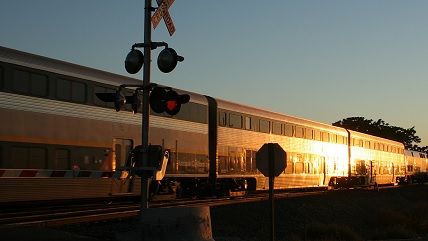More Trouble for Jerry Brown's Rail Boondoggle
Concealed report: Overruns, delays plague high-speed rail

One of the biggest problems with California Gov. Jerry Brown's efforts to battle climate change is the "do or die" nature of the situation. Based on his rhetoric, there's little room for debate over costs, benefits, details and oversight. When the future of the Earth is at stake, then nothing else seems to matter. A new brouhaha over one of Brown's signature anti-climate-change projects illustrates this situation.
I'm referring to the construction of a $68-billion (for now) high-speed rail system that connects Los Angeles with San Francisco, in a promised 2 hours and 40 minutes (but don't count on it). It's supposed to slow climate change by creating an alternative to driving up and down the state in cars. An investigative report last week suggests state officials have concealed from the public information about likely cost overruns and delays.
The idea has long generated controversy, but in 2008 voters approved, with nearly 53 percent of the vote, Proposition 1A, which authorized nearly $10 billion in bonds to begin the construction of such a rail line. Early cost estimates soared to at least $98.5 billion, but were scaled back to $68 billion after the newly created rail authority changed some significant aspects of the project. As years go by, the project barely resembles the one promised to voters.
For instance, instead of speeding from LA to the Bay Area, the train would share track with commuter trains in those heavily urbanized areas. That cut back on costs, but slowed the travel times. Even one of its key authors, former Sen. Quentin Kopp (I), disavowed the project given that it no longer resembled the original proposal.
The Brown administration trudged forward, even after a Sacramento Superior Court judge ruled against the project because it lacked sufficient funding streams to get started. Proposition 1A was tightly written, filled with detailed promises designed to woo voters. It promised certain costs, travel times, prevented the use of operating subsidies and forbade the rail authority from spending authorized bond dollars until it detailed funding for the initial segment.
Ultimately, the judge's attempt to force the Brown administration to, in part, live up to the initiative's promises was overturned by an appeals court. The state Supreme Court chose not to review that decision, and it's been full-speed ahead since.
But there's no getting around the project's contradictions and overly optimistic promises. That Los Angeles Times investigative report confirms not only ongoing schedule and cost problems, but the degree to which the state has taken a secretive approach to the project. Who cares about a few billion dollars, years of delay and open records when the Earth's future is at stake?
Pointing to the "geologically complex mountains north of Los Angeles" that must be tunneled through, the Times' "analysis of project documents, as well as interviews with scientists, engineers and construction experts, indicates the deadline and budget targets almost certainly will be missed—and that the state has underestimated the challenges ahead, particularly completing the tunneling on time."
A top contractor, Parsons Brinckerhoff, produced a confidential report showing a 31-percent increase in the cost of building the first phase of the project, and a predicted a 5-percent increase in the overall cost of the project. Even though state officials had that report in 2013, "the state used a lower cost estimate when it issued its 2014 business plan four months later," according to the newspaper.
The authority's chief executive officer Jeff Morales said he was unaware of that number. But as a Union-Tribune editorial noted, Morales' last position was senior vice president of Parsons Brinckerhoff. By the way, the authority refused to provide the report to the Times under the public-records act, but the newspaper acquired it from an engineer.
In response, four Republican Assembly members representing districts affected by the project, sent a letter to Assembly Speaker Toni Atkins, D-San Diego, requesting a subpoena demanding the rail authority provide the Parsons Brinckerhoff report, a list of state officials briefed on its content, and various electronic and paper documents referencing it. They haven't gotten a response.
"The business plan," they wrote, "which we now know to be the lower of two estimates, was used as the basis for the Legislature's decision to continuously appropriate 25 percent of cap-and-trade revenue for high-speed rail. The authority continued to mislead the Legislature in two subsequent project update reports, and has yet to publicly disclose this $9 billion cost increase."
This is a massive project, the largest state infrastructure undertaking in the nation's history. Skeptics doubt it will do much to reduce global warming, but voters and the courts have had their say on that question. California voters still deserve serious oversight of its spending, rather than a "this is too important for you know about" approach.


Show Comments (43)